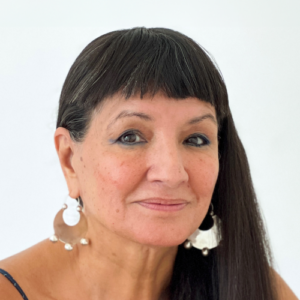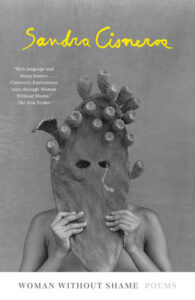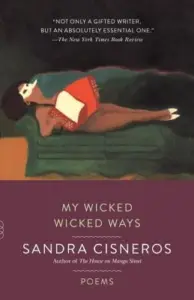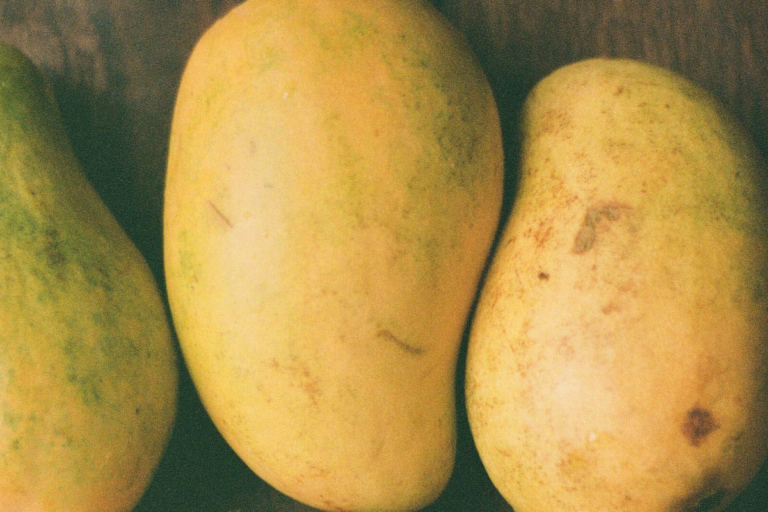Sandra Cisneros
When in Doubt
Even in the most uneventful of human lives, uncertainty and doubts will inevitably intrude. When faced with those, what can you do to steady yourself? One suggestion: Turn to the poem “When in Doubt” by Sandra Cisneros, where she generously shares some of the wisdom that she’s gleaned over the years.
We’re pleased to offer Sandra Cisneros’s poem, and invite you to read Pádraig’s weekly Poetry Unbound Substack, read the Poetry Unbound book, or listen back to all our episodes.

Image by Annisa Hale/ Film processed by Moody's Film Lab, © All Rights Reserved.
Guest

Sandra Cisneros is a poet, short story writer, novelist, essayist, performer, and artist. Cisneros’s most recent collection is Woman Without Shame (Knopf Publishing Group 2022). Her numerous awards include NEA fellowships in both poetry and fiction, a MacArthur Fellowship, national and international book awards, including the PEN America Literary Award, and the National Medal of Arts. More recently, she received the Ford Foundation's Art of Change Fellowship, was recognized with the Fuller Award for Lifetime Achievement in Literature, and won the PEN/Nabokov Award for Achievement in International Literature. In 2022, she was awarded the Poetry Foundation’s Ruth Lilly Poetry Prize. In addition to her writing, Cisneros has fostered the careers of many aspiring and emerging writers through two nonprofits she founded: the Macondo Foundation and the Alfredo Cisneros del Moral Foundation. Image by Keith Dannemiller.
Transcript
Transcription by Alletta Cooper
Pádraig Ó Tuama: My name is Pádraig Ó Tuama and years ago when I was starting off mediation training for conflict mediation somebody said, “Most people do what seems reasonable to them most of the time.” And I found that to be filled with wisdom. “Most people do what seems reasonable to them most of the time.” And the “seems” there is really important. That for myself, I do things that seem reasonable until maybe two minutes later or ten minutes later or a year later when I go, “That wasn’t reasonable at all.” But the recognition that it seemed reasonable at the time allows for things to change, it allows, I think, for some kind of compassion towards yourself and others even as you hope that things will get better. It’s advice that I’ve heeded by and that has gotten me out of hot water from time to time as well as helped me apologize.
[music: “Praise the Rain” by Gautam Srikishan]
“When in Doubt” by Sandra Cisneros
“When in doubt,
Wear faux leopard.
“When in doubt,
Err on the side of generosity.
“When in doubt,
Greet everyone as you would the Buddha.
“When in doubt,
Collect blessings from those who own nothing.
“When in doubt,
Absorb biographies to avoid life’s major mistakes.
“When in doubt,
Make life’s major mistakes.
“When in doubt,
Pay attention to the vendor shouting ‘Diooooos,’
Even when you find out he was only shouting, ‘Gaaaaas.’
“When in doubt,
Carry a handkerchief and a fan.
“When in doubt,
Thank everyone. Twice.
“When in doubt,
Heed the clouds.
“When in doubt,
Sleep on it.
“When in doubt,
Treat all sentient and insentient beings as kin.
“When in doubt,
Forgive us our myopia
As we forgive those who are myopic against us.
“When in doubt,
Unreel your grief to a tree.
“When in doubt,
Remember this.
We are all on a
Caucus-race.
“There is no start.
No finish.
Everyone wins.”
[music: “Outstretched Hand” by Gautam Srikishan]
This is a poem where the refrain of a line, “when in doubt, when in doubt,” is repeated the whole way throughout it. In a poem, when something repeats itself so much, it can begin to take on all kinds of other meanings, too. It becomes a little bit like a blank canvas. It becomes a little bit like a small pause point, a little rest in music, where you can absorb what you’ve just heard and anticipate what’s coming next, because the “when in doubt” functions as something that becomes known throughout the poem.
The poem is a series of instructions. It’s in the imperative, “When this happens, do this.” And the speaker has absolute clarity about all the kinds of things that the speaker of the poem, Sandra Cisneros, is telling us. And then there’s a listener too, which is us. We’re being told what to do. “Forgive us our myopias / As we forgive those who are myopic against us.” “Unreel your grief to a tree.” “Absorb biographies to avoid life’s major mistakes.” These instructions that are coming from somebody who, as the poem unfolds, you begin to trust them a bit more. Because at the start it’s, it’s a bit funny, “wear a faux leopard” and “greet everyone as you would the Buddha.” Sounds a little bit like this is going to be some kind of instruction for the virtuous life. But then after the “Absorb biographies to avoid life’s major mistakes” one, it takes a turn because it says, “When in doubt, / Make life’s major mistakes.”
Suddenly we think, “Oh, who’s this personality?” They’re not just telling us what to do. We’re beginning to get a sense of, “Who are you? What major mistakes have you made?” That rather than just a set of instructions, this is a sharing of generosity, a sharing of, “Well, here’s what I’ve learned. Maybe it’ll be helpful for you.”
[music: “The Willows” by Gautam Srikishan]
The speaker of the poem, Sandra Cisneros, is speaking with great certitude about incertitude. And the unfolding advice of the poem seems to be: in times of incertitude think about things like pleasure and generosity and hospitality and your relationship with people and gratitude. And it’s also saying: Try to be in the world. Try not to be outside of it, living some perfect kind of life. Try to be in it, living the complicated life that you have. And even in that world, pay attention to other sentient and insentient beings. Tell your grief to the tree. It’s like a secular set of commandments, this poem, and it does have a register of religion as it says, “When in doubt / Forgive us our myopia / As we forgive those who are myopic against us.” Picking up on a line that you find in the Gospels, instruction and prayer, “forgive us our trespasses as we forgive those who trespass against us.”
It’s interesting that the line from the Gospels is “trespass” and she replaces that with “myopia,” something that says you just haven’t seen something properly yet. Look again. And also perhaps you haven’t been seen properly yet. Hopefully, other people will look again at you. And hopefully, you too will look at other people where it’s the fault of your looking that has meant that you haven’t seen them.
Also, toward the start of the poem, “When in doubt / Greet everyone as you would the Buddha.” And then even in the mistaken hearing of the vendor shouting, the vendor is shouting “gas,” but the mistaken hearing is that the vendor is shouting “Dios” — God — which is perhaps to say that there is a sacred underpinning to everything, even in the mishearings, even in what’s happening on the street, even in random people who are speaking on the street where you only overhear snippets, that that — the sound of the every day — too, is something sacred.
[music: “First Grief, First Air” by Gautam Srikishan]
“When in Doubt,” which is the title it’s a poem of 16 stanzas, and 15 of the stanzas begin with those three words of the title, “When in doubt.” But the first and the final word of that little refrain are really important to pay attention to in the work that they do in the poem. “When in doubt.” This isn’t saying “if.” This isn’t saying, “This might happen or it might not.” It’s saying, “It will.” That’s what the poem knows about being alive. You will be in doubt. You’ll be in situations where you don’t know what to do, where you’ll be choosing between the generous or the miserly. Or where your fear tells you one thing. Or where your intuition might suggest another or where you don’t want to witness people where you want to isolate yourself or you don’t feel like you want to demonstrate any gratitude or where you do feel very alone. Or it also says there’ll be times when you will need to take more time before you react. There’ll be times when you’re surrounded by nature and nature will be the companion in your grief. It’s also to say you will have grief and you will be hurt by others and you will hurt others. All of this will happen.
And that’s the certitude of the poem, which is to say life occurs and you are part of it, so it will be occurring around you. And here might be some of the ways where you could respond to what we inevitably know will happen to everyone with some of the practices that might hold you steady in the unsteady nature of trying to survive and get through these things with something of your own recognizable self.
And it isn’t only survive and get through, it’s also pay attention to the people around you. “Thank everyone. Twice.” There’s sentient and insentient beings, there’s people around this poem and it’s alerting everyone to not feel like you’re in a race, a caucus-race, this isn’t about being a winner or a loser.
A caucus-race is, you know, the “competitive process by which a political party selects their candidate.” And I wondered, what is this race within the way that the poem’s unfolding? No start, no finish, everyone wins. I wonder, is this naivety? But it isn’t a book of naivety. This is a book that knows what it’s like to be alive.
It’s a recognition, perhaps, that, look, we’re all going to die here. Everybody loses in a certain sense, so we might as well try to find a way where everybody wins along the way.
[music: “Dust of Summer” by Gautam Srikishan]
This is the final poem in Sandra Cisneros’ collected poems, which was published in the last couple of years. The book has titles in Spanish and in English. The English title is Woman Without Shame. The Spanish is Mujer Sin Vergüenza. And the acknowledgments right at the end of the book, in a certain sense, I almost feel like it’s a story of her own life that continues on the poem, even though it’s just in the acknowledgment section.
She says, “church bells are ringing as I write this,” and writing the acknowledgments at the end of the book. “Some sound like church bells, [and] some sound like a tin cup banged across prison bars, and some like an angry mother clanging un comal,” a griddle. And then it finishes by saying, “I have winnowed these poems from three decades, two countries and too many houses. In seventeen days I will be sixty-seven. It is time I let them go.”
I almost feel like that narrative, just the way that she finishes off the acknowledgments section at the end of a book that’s collected poems from across her life. I feel like that is telling us the fertile ground from which this poem, “When in Doubt,” has come. That this is a way that she is both the speaker and the addressee of her poem. She’s looking back over her life and speaking to herself. This poem is in the final section of the book, which is called “Pilón.” And it’s the single poem in the section, and it feels like a retrospective. I don’t know if it is, but in the placing of it in the book, it feels like she’s saying, “This is what I’ve arrived at. This is the way that I’ve learned how to live my life.” And she’s sharing it very generously.
This isn’t a voice of instruction that is outside of the circumstances of every life. This is a voice that said, “I’ve been in life.” She’s worked as a writer for all of her life. She’s renowned as a Chicana poet, and Chicana novelist, working in cross form. She’s a philanthropist for other writers. She’s been based in Chicago and Texas. She lives now in Mexico. So this is a life that has moved, a life that has seen, and a life that has been dedicated — through Buddhism, through language, through form, through art — to the kinds of behaviors that the poem is urging people towards. It feels in a certain sense like some kind of personal creed that she’s opening up to finish off a book that is also a collection of her own life.
[music: “Into the Earth” by Gautam Srikishan]
“When in Doubt” by Sandra Cisneros
“When in doubt,
Wear faux leopard.
“When in doubt,
Err on the side of generosity.
“When in doubt,
Greet everyone as you would the Buddha.
“When in doubt,
Collect blessings from those who own nothing.
“When in doubt,
Absorb biographies to avoid life’s major mistakes.
“When in doubt,
Make life’s major mistakes.
“When in doubt,
Pay attention to the vendor shouting ‘Diooooos,’
Even when you find out he was only shouting, ‘Gaaaaas.’
“When in doubt,
Carry a handkerchief and a fan.
“When in doubt,
Thank everyone. Twice.
“When in doubt,
Heed the clouds.
“When in doubt,
Sleep on it.
“When in doubt,
Treat all sentient and insentient beings as kin.
“When in doubt,
Forgive us our myopia
As we forgive those who are myopic against us.
“When in doubt,
Unreel your grief to a tree.
“When in doubt,
Remember this.
We are all on a
Caucus-race.
“There is no start.
No finish.
Everyone wins.”
[music: “Praise the Rain” by Gautam Srikishan]
Chris Heagle: “When in Doubt” comes from Sandra Cisneros’s book Women Without Shame. Thank you to Stuart Bernstein who gave us permission to use Sandra’s poem. Read it on our website at onbeing.org.
[music: “Praise the Rain” by Gautam Srikishan]
Poetry Unbound is: Gautam Srikishan, Eddie Gonzalez, Lilian Vo, Lucas Johnson, Amy Chatelaine, Kayla Edwards, Annisa Hale, and me, Chris Heagle.
Our music is composed and provided by Gautam Srikishan and Blue Dot Sessions.
This podcast is produced by On Being Studios, which is located on Dakota land. Open your world to poetry with us by subscribing to our Substack newsletter. You may also enjoy Pádraig’s book, Poetry Unbound: Fifty Poems to Open Your World. For links and to find out more visit poetryunbound.org.
Books & Music
Recommended Reading
The On Being Project is an affiliate partner of Bookshop.org and Amazon.com. Any earnings we receive through these affiliate partnerships go into directly supporting The On Being Project.








